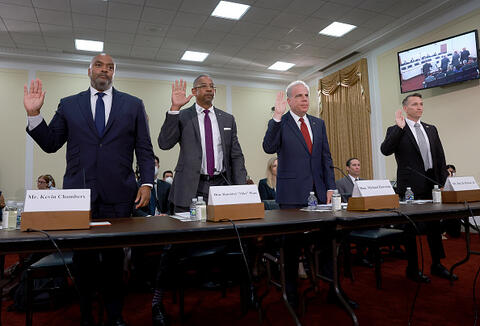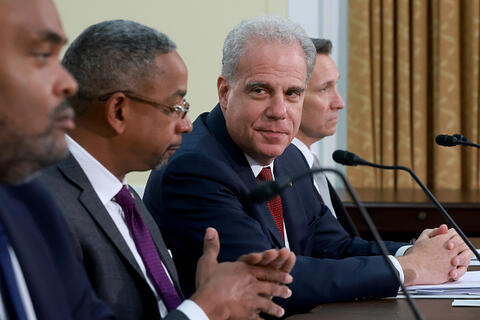
Washington, DC — Michael E. Horowitz, Chair of the Pandemic Response Accountability Committee (PRAC) and Inspector General at the U.S. Department of Justice, testified before the House Select Subcommittee on the Coronavirus Crisis on Tuesday, June 14, 2022. In his testimony, Chair Horowitz discussed the PRAC’s ongoing oversight work and achievements over its first two years. He also emphasized the need to curtail identity fraud across government programs and how pending legislative action will help watchdogs hold domestic and international fraudsters accountable.
“Federal watchdogs are committed to making sure we use every single tool available to not only hold individuals and entities accountable for fraud and wrongdoing, but to recover every single penny for the taxpayers. That’s our responsibility and our goal,” testified Chair Horowitz. Read the full written testimony here.
In his testimony, titled Examining Federal Efforts to Prevent, Detect, and Prosecute Pandemic Relief Fraud to Safeguard Funds for All Eligible Americans, Chair Horowitz also emphasized:
The scourge of identity fraud in government programs, including pandemic relief.
Identity theft has been endemic in pandemic fraud cases. The PRAC established the Identity Fraud Reduction and Redress Working Group—comprised of member Inspectors General to help reduce identity fraud in pandemic relief and other government programs and to help people recover if they are victims of identity theft.
As Chair Horowitz noted in his testimony, the Working Group published its first report this week, a roundup of oversight work highlighting the prevalence of identity theft in pandemic fraud, with recommendations for ways to prevent and respond on behalf of victims.
“Because of the siloed nature of government, each benefits program has its own redress process, leaving victims lost in a bureaucratic maze that they have to figure out on their own,” Chair Horowitz said. “The PRAC’s priority is to help identify gaps in victim redress, figure out how to address them, and help victims move forward—and regain their rightful benefits.”
Pending legislation that will help watchdogs go after pandemic fraudsters.

Chair Horowitz testified that three bipartisan bills would help watchdogs recover fraudulently diverted tax dollars and extend the time available to hold criminals accountable. To date, the oversight community is actively pursuing more than 1,150 investigations into unemployment insurance and small business loan fraud.
The first is the Administrative False Claims Act of 2021, S.2429, which raises the jurisdictional limit for administrative recoveries of “smaller” false or fraudulent claims against the government from $150,000 to $1 million. S.2429 is currently pending on the Senate floor. On June 8, 2022, the House passed two bipartisan bills to extend of the statute of limitations for Paycheck Protection Program (PPP) and COVID-19 Economic Injury Disaster Loan (EIDL) fraud from 5 to 10 years.
“The 10-year statute of limitations is consistent with that for bank fraud, which has been charged in most cases of alleged PPP fraud for loans issued by traditional banks,” Chair Horowitz testified. “However, many loans in small business pandemic relief programs were issued by nonbank financial technology companies, or fintechs. Fraud cases involving fintech companies are prosecuted as wire fraud, which has a statute of limitations of five years.”
The PRAC continues to shine a light on what has gone well and what needs to be improved.
The PRAC and member IGs are currently working on more than 200 pandemic oversight engagements that focus on issues like public health and safety and how to prevent and detect fraud in government programs.
The PRAC is also increasing transparency efforts by spotlighting the oversight work of state, local, and Tribal governments, rolling out new content on this website, and engaging in community outreach through our events.
Finally, the PRAC released its first update to Lessons Learned in Oversight of Pandemic Relief Funds with five additional lessons. This report was first issued in September 2021 to examine the key question: Has pandemic spending been effective and if not, what needs to change?
###
The PRAC was established by the CARES Act to promote transparency and support independent oversight of the funds provided by the CARES Act and other related emergency spending bills. In addition to its coordination and oversight responsibilities, the PRAC is tasked with supporting efforts to “prevent and detect fraud, waste, abuse, and mismanagement [and] mitigate major risks that cut across program and agency boundaries.”
If you have additional questions, please contact Lisa Reijula at lisa.reijula@cigie.gov
Top photo, L-R: Kevin Chambers, Director for COVID-19 Fraud Enforcement, Department of Justice; Hannibal "Mike" Ware, Inspector General, Small Business Administration; Michael Horowitz, Chair, Pandemic Response Accountability Committee; and Roy D. Dotson Jr., Acting Special Agent in Charge, National Pandemic Fraud Recovery Coordinator, United States Secret Service. (Photos by Joe Raedle/Getty Images)

